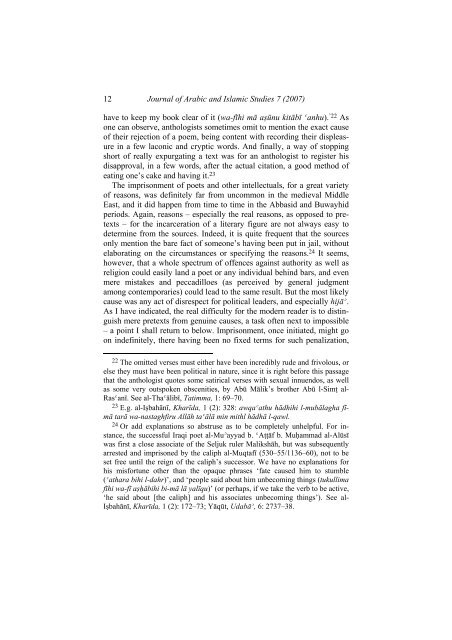Freedom of Expression and Censorship in Medieval Arabic Literature
Freedom of Expression and Censorship in Medieval Arabic Literature
Freedom of Expression and Censorship in Medieval Arabic Literature
Create successful ePaper yourself
Turn your PDF publications into a flip-book with our unique Google optimized e-Paper software.
12<br />
Journal <strong>of</strong> <strong>Arabic</strong> <strong>and</strong> Islamic Studies 7 (2007)<br />
have to keep my book clear <strong>of</strong> it (wa-fīhi mā aṣūnu kitābī ʿanhu). ’22 As<br />
one can observe, anthologists sometimes omit to mention the exact cause<br />
<strong>of</strong> their rejection <strong>of</strong> a poem, be<strong>in</strong>g content with record<strong>in</strong>g their displeasure<br />
<strong>in</strong> a few laconic <strong>and</strong> cryptic words. And f<strong>in</strong>ally, a way <strong>of</strong> stopp<strong>in</strong>g<br />
short <strong>of</strong> really expurgat<strong>in</strong>g a text was for an anthologist to register his<br />
disapproval, <strong>in</strong> a few words, after the actual citation, a good method <strong>of</strong><br />
eat<strong>in</strong>g one’s cake <strong>and</strong> hav<strong>in</strong>g it. 23<br />
The imprisonment <strong>of</strong> poets <strong>and</strong> other <strong>in</strong>tellectuals, for a great variety<br />
<strong>of</strong> reasons, was def<strong>in</strong>itely far from uncommon <strong>in</strong> the medieval Middle<br />
East, <strong>and</strong> it did happen from time to time <strong>in</strong> the Abbasid <strong>and</strong> Buwayhid<br />
periods. Aga<strong>in</strong>, reasons – especially the real reasons, as opposed to pretexts<br />
– for the <strong>in</strong>carceration <strong>of</strong> a literary figure are not always easy to<br />
determ<strong>in</strong>e from the sources. Indeed, it is quite frequent that the sources<br />
only mention the bare fact <strong>of</strong> someone’s hav<strong>in</strong>g been put <strong>in</strong> jail, without<br />
elaborat<strong>in</strong>g on the circumstances or specify<strong>in</strong>g the reasons. 24 It seems,<br />
however, that a whole spectrum <strong>of</strong> <strong>of</strong>fences aga<strong>in</strong>st authority as well as<br />
religion could easily l<strong>and</strong> a poet or any <strong>in</strong>dividual beh<strong>in</strong>d bars, <strong>and</strong> even<br />
mere mistakes <strong>and</strong> peccadilloes (as perceived by general judgment<br />
among contemporaries) could lead to the same result. But the most likely<br />
cause was any act <strong>of</strong> disrespect for political leaders, <strong>and</strong> especially hijāʾ.<br />
As I have <strong>in</strong>dicated, the real difficulty for the modern reader is to dist<strong>in</strong>guish<br />
mere pretexts from genu<strong>in</strong>e causes, a task <strong>of</strong>ten next to impossible<br />
– a po<strong>in</strong>t I shall return to below. Imprisonment, once <strong>in</strong>itiated, might go<br />
on <strong>in</strong>def<strong>in</strong>itely, there hav<strong>in</strong>g been no fixed terms for such penalization,<br />
22 The omitted verses must either have been <strong>in</strong>credibly rude <strong>and</strong> frivolous, or<br />
else they must have been political <strong>in</strong> nature, s<strong>in</strong>ce it is right before this passage<br />
that the anthologist quotes some satirical verses with sexual <strong>in</strong>nuendos, as well<br />
as some very outspoken obscenities, by Abū Mālikʼs brother Abū l-Simṭ al-<br />
Rasʿanī. See al-Thaʿālibī, Tatimma, 1: 69–70.<br />
23 E.g. al-Iṣbahānī, Kharīda, 1 (2): 328: awqaʿathu hādhihi l-mubālagha fīmā<br />
tarā wa-nastaghfiru Allāh taʿālā m<strong>in</strong> mithl hādhā l-qawl.<br />
24 Or add explanations so abstruse as to be completely unhelpful. For <strong>in</strong>stance,<br />
the successful Iraqi poet al-Muʾayyad b. ʿAṭṭāf b. Muḥammad al-Alūsī<br />
was first a close associate <strong>of</strong> the Seljuk ruler Malikshāh, but was subsequently<br />
arrested <strong>and</strong> imprisoned by the caliph al-Muqtafī (530–55/1136–60), not to be<br />
set free until the reign <strong>of</strong> the caliphʼs successor. We have no explanations for<br />
his misfortune other than the opaque phrases ‘fate caused him to stumble<br />
(ʿathara bihi l-dahr)’, <strong>and</strong> ‘people said about him unbecom<strong>in</strong>g th<strong>in</strong>gs (tukullima<br />
fīhi wa-fī aṣḥābihi bi-mā lā yalīqu)’ (or perhaps, if we take the verb to be active,<br />
‘he said about [the caliph] <strong>and</strong> his associates unbecom<strong>in</strong>g th<strong>in</strong>gs’). See al-<br />
Iṣbahānī, Kharīda, 1 (2): 172–73; Yāqūt, Udabāʾ, 6: 2737–38.

















